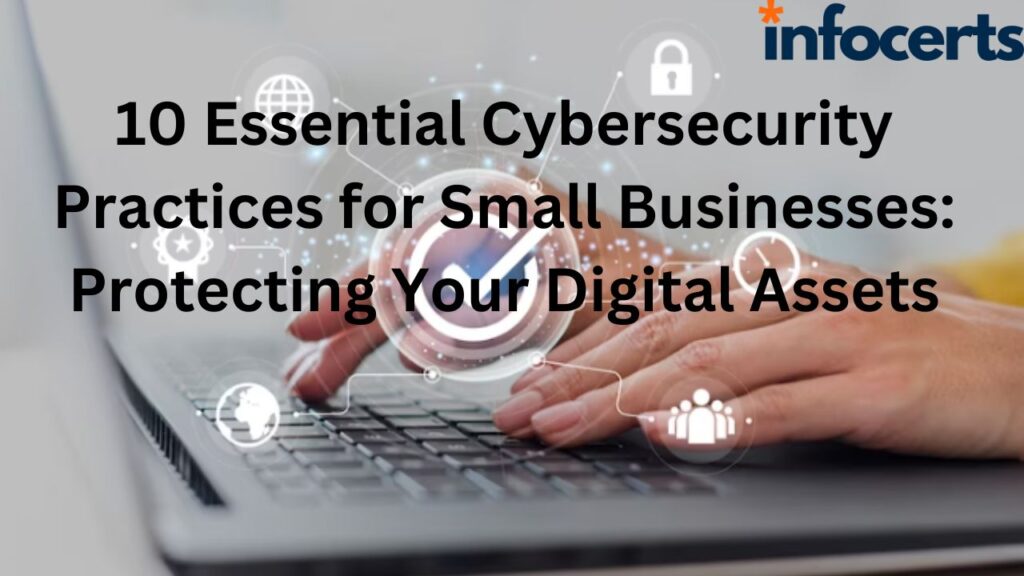Introduction:
In today’s increasingly digital world, small businesses are at risk of becoming prime targets for Cyberattacks. The consequences of such attacks can be devastating, ranging from financial losses to reputational damage. Therefore, it is crucial for small business owners to prioritize cybersecurity to safeguard their digital assets. Here are ten essential cybersecurity practices for small businesses that can help your small business stay secure and resilient:
- Employee Training: Educate your employees about cybersecurity practices for small businesses, including recognizing phishing emails, using strong passwords, and reporting suspicious activities. Human error is a common entry point for cyber threats, and well-informed staff can serve as the first line of defense.
- Regular Software Updates: Keep all your operating systems, applications, and above all software up to date. Regular updates often include Security patches that address vulnerabilities that cybercriminals may exploit.
- Strong Password Policies: Enforce strong password policies, including using a combination of upper and lower case letters, numbers, and special characters. Encourage employees to change passwords regularly.
- Data Encryption: Encrypt sensitive data, both at rest and in transit. This ensures that even if data is intercepted, it remains unintelligible to unauthorized users.
- Multi-factor Authentication (MFA): Implement MFA for all critical accounts and systems. MFA adds an extra layer of protection by requiring users to provide two or more forms of identification before accessing an account.
- Firewall and Antivirus Protection: Install and maintain both robust Firewalls and antivirus software to safeguard against malware and unauthorized access.
- Secure Wi-Fi Network: Secure your Wi-Fi network with strong encryption and change default passwords on routers. Separate not only guest but also business networks to prevent unauthorized access.
- Regular Data Backups: Regularly back up your whether business data an store it securely off-site or in the cloud. This ensures you can quickly recover from neither data breaches nor ransomware attacks.
- Access Control: Limit access to sensitive data and systems only to authorized personnel. Use role-based access controls to ensure employees have the appropriate level of access for their responsibilities.
- Incident Response Plan: Develop and practice an incident response plan to handle cyber incidents effectively. This plan should include steps for identifying, containing, eradicating, and recovering all in all .
- from Cybersecurity Breaches.
| Cybersecurity Practice | Example |
| Employee Training | Conduct regular workshops on identifying phishing emails. |
| Regular Software Updates | Update both operating systems and applications weekly. |
| Strong Password Policies | Enforce a policy requiring passwords with a minimum of 12 characters. |
| Data Encryption | Encrypt sensitive customer data before storing it in the database. |
| Multi-factor Authentication | Require employees to use both a password and fingerprint to log in. |
| Firewall and Antivirus Protection | Install a whether robust firewall or update antivirus software daily. |
| Secure Wi-Fi Network | Use WPA2 Encryption and change router passwords every three months. |
| Regular Data Backups | Perform daily backups of both important files and store them on a secure server. |
| Access Control | Limit access to financial data only to authorized finance department staff. |
| Incident Response Plan | Practice a mock cybersecurity breach to test and refine the response plan. |
By following these ten essential cybersecurity practices, your small business can significantly reduce the risk of cyber threats and protect your digital assets. Remember, cybersecurity is an ongoing process, so regularly assess and update your security measures to stay one step ahead of potential attackers. Prioritizing cybersecurity will not only safeguard your business but also instill trust and confidence in your customers and partners. Stay secure, stay resilient!
FaQs:
- What are the essential cybersecurity practices for small businesses?
- Why is employee training crucial in maintaining cybersecurity?
- How often should software updates be performed to stay secure?
- What elements make up a strong password policy?
- Why is data encryption important for small businesses?
——————————————————————————————————————–
Infocerts, 5B 306 Riverside Greens, Panvel, Raigad 410206 Maharashtra, India
Contact us – https://www.infocerts.com

